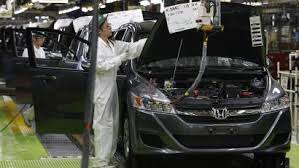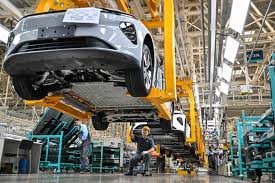Global parts and chip scarcity is wreaking havoc on Japanese businesses, with seven out of eight automakers reporting a decline in global output in September, casting doubt on the Bank of Japan’s belief that supply bottlenecks are only temporary.
Toyota Motor reported on Thursday that global output fell 39.1% year over year in September to 512,765 units, marking the second consecutive month of declines.
According to figures published by the manufacturers, Nissan Motor’s global output declined for the third month in a row, by 27.9%, while Honda motors fell for the fourth month in a row, by 30%.
The automakers’ output cuts are affecting suppliers, including Hitachi which dropped its consolidated operating profit outlook for the current fiscal year, which ends in March 2022, somewhat on Wednesday.
“It’s likely that the impact of (chip shortages) was stronger in the third quarter than it was in the second quarter,” Hitachi’s chief financial officer Yoshihiko Kawamura said at a press briefing.
Canon Inc, a maker of electronic equipment, lowered its operating profit forecast for 2021 by 11 billion yen ($97 million) to 272 billion yen, citing rising parts costs and production disruptions in Southeast Asia due to COVID-19.
With infection rates falling in many Asian countries, some analysts predict that supply limitations may improve in the coming months. In November, Toyota anticipates worldwide output to rebound to roughly 850,000-900,000 units.
However, the industrial disruptions might be a serious blow to Japan’s economy, which has relied on exports to counter sluggish consumer demand as the COVID-19 outbreak continues to wreak havoc.
In a quarterly report released on Thursday, the Bank of Japan lowered its economic growth projection for this year, blaming weak consumer demand and supply restrictions.
However, it boosted its growth prediction for the coming fiscal year and labeled the export and output slowdown as “temporary.”
Nonetheless, the central bank warned that if supply bottlenecks remain longer than planned, the economy could “worsen considerably.”


















